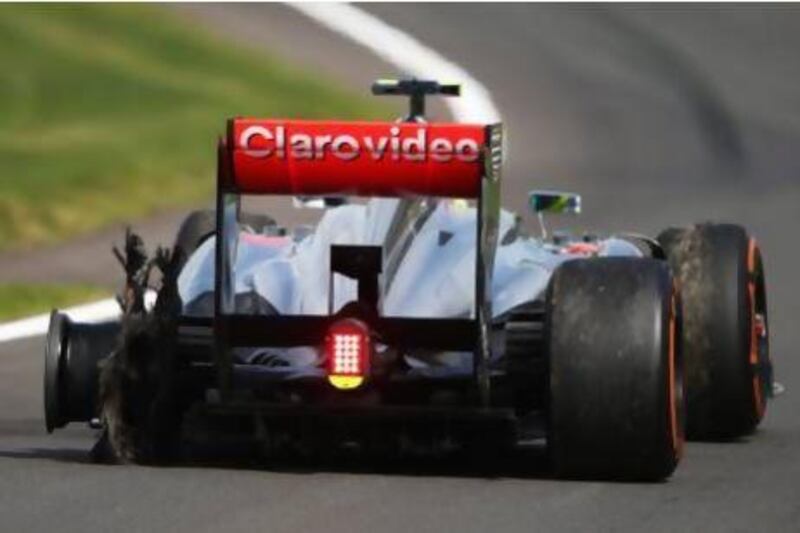Nico Rosberg finished first at the British Grand Prix at Silverstone, but he should have placed second.
Safety must come first always and on Sunday it clearly did not.
The eighth race of a world championship already characterised by tyre issues saw four drivers suffer explosive blowouts at high-speed, while another two also experienced less dramatic failures in what must be the most dangerous grand prix race in recent memory.
Michael Schumacher once said racing on the narrow, winding streets of Monaco is "justifiable once a year", but driving a car at speeds in excess of 250 kph on what is essentially a set of balloons that could pop at any moment is indefensible always.
Rosberg called it "the first time in my career I've ever felt [the sport] was dangerous".
If teams cannot trust their tyres, the sport's governing body cannot expect teams to race.
Yet on Sunday, they did.
As Mark Webber of Red Bull Racing put it: "We are part of the show and the show must go on by the looks of it."
Perhaps the balloon analogy is fitting of the circus-like form of entertainment that F1 is becoming.
"This is no longer a sport," said one driver, in private.
The obvious time to stop the charade came in the 15th lap.
The explosion of Jean-Eric Vergne's left-rear tyre was the third dramatic blowout in the space of seven laps.
A safety car was immediately deployed, but not because the Frenchman had suffered his tyre failure only a few metres ahead of Lotus's Roman Grosjean and Kimi Raikkonen, thus highlighting the dangers.
The safety car was deployed because the myriad of debris that had accumulated from Vergne's explosion combined with that of Lewis Hamilton's and Felipe Massa's proved too much to race on.
Charlie Whiting, the race director that follows F1 to each circuit around the world, later conceded he came close to suspending the race.
He should have.
When drivers speak of "zero safety" like Massa did, and guys such as Hamilton later reveal they are driving thinking the only way the race will be stopped is if somebody gets hurt, it becomes pretty clear something needs to be done.
It takes a lot to frighten a man who races wheel-to-wheel at such high speeds, but Fernando Alonso, a two-time world champion, conceded he was "so scared and so lucky" after Sergio Perez's tyre detonated immediately in front of him.
Alonso came within a centimetre or two of colliding with the Mexican, but equally as worrying was the fact the rubber off Perez's tyre could have been spat out in the direction of Alonso's helmet.
It is no exaggeration to suggest a strap of solid rubber laced with metal hitting a driver on the face at such a speed could have proved fatal.
As Christian Horner, the Red Bull team principal, intimated post-race, the Spaniard was very fortunate to be going home and not to a nearby hospital.
Or worse.
Pirelli are the obvious pantomime villains, but the FIA must take responsibility for endangering the lives of the drivers.
Were it not for the FIA's abstruse, inflexible regulations, the situation could have been avoided.
The Italian tyre manufacturers have been trying to introduce safer compounds for the past month, but have faced a number of obstacles courtesy of the governing body and F1's decision-makers.
The confirmation on Monday that Pirelli will be allowed two, three-day test sessions with a 2013 car is a swift and positive step by the FIA, even though it opens them up to a complex legal battle.
As ever in this most Machiavellian of sports, politics threatens to cause problems.
Mercedes-GP, reprimanded last week for their involvement in a private tyre test, will watch keenly to see if this month's young driver test – from which they were banned evolves – into a full-scale test.
If it does, they are sure to explore certain loopholes as they are not banned from a full-blown test; if it does not, it will prove fascinating to see what team is chosen to take part in the extraordinary tests given the recently declared advantages of such tyre trials.
Whatever the outcome, the objective must not become blurred.
The German Grand Prix starts in earnest on Friday, but the next two races are on circuits less demanding of the rubber compounds.
Such facts should not mean time is on the side of the decision-makers, though.
Tyres have tarnished races in Malaysia, Bahrain and Spain and until the precise reason is understood, safety cannot be confidently assured.
The team boycott that has been threatened, is unlikely to materialise, but the FIA must not dither.
Safety must be the priority – now and always.
If the tyres cannot be trusted, the cars must not take to the track.
Follow us
[ @SprtNationalUAE ]
and @gmeenaghan
[ @gmeenaghan ]





